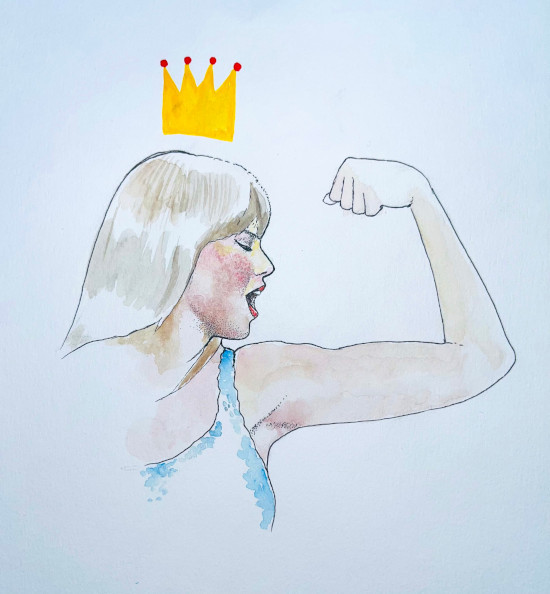A marketing ‘mastermind’
Was 2023 the year of Taylor Swift?

Illustration by Gabrielle Funk
With 2023 finally in the rearview, it appears that it was a year brimming with reimaginings. Pop-culturally, the year felt bombastic, an undeniable response to years shrouded in uncertainty and despondence.
Major blockbusters like Barbie and Oppenheimer battled it out in cinemas, and Queen Bey made an iconic return via a smash-hit world tour for the newest addition to her catalog, Renaissance.
For Swifties around the world, these events existed on the periphery as the era of Taylor Swift pressed on in full force.
Whether you were “...Ready For It?” or not, it seemed like nobody could avoid the popstar sensation this year. In December, Time magazine rewarded Swift’s compelling omnipresence by naming her their 2023 Person of the Year.
This isn’t the first time the magazine has honoured Swift. In 2017, she was a part of The Silence Breakers, a group of women who, according to Time and CBS, “ignited the anti-harassment #MeToo movement.” This makes her the first woman to grace the cover of Time magazine twice.
While some couldn’t help but roll their eyes at another mention of the singer, in my estimation, this is an indication of a job well done.
By Time’s own definition, the title of Person of the Year goes to “The person or persons who most affected the news and our lives, for good or ill, and embodied what was important about the year, for better or for worse,” as written by Walter Isaacson in the 1998 issue.
Whether or not everyone personally finds Swift important is less relevant than the overarching cultural impact of her presence.
My own father, who struggles to remember the names of any celebrities born after the year 1965, heard about Swift's Eras Tour (and its nearly unattainable tickets), bought me passes to see a Candle Light concert rendition of her hits.
My mother, who, to her credit, is somewhat fluent in contemporary pop culture, debated the merit of the success of the Taylor’s Versions.
After Swift’s first six albums were sold against her will to record executive and mentor Scooter Braun for more than $400 million, she decided to re-record and re-release these albums as Taylor’s Versions. She now owns these record-breaking versions, which I would argue is a well-earned win.
While the general public is likely oblivious to when and why Swift has been reborn in the public zeitgeist, rapid superfans and loyal supporters (where I personally identify) have been privy to her re-ascent to popstar royalty.
Music fans experienced a total Taylor takeover following the release of the formative 1989 in 2015. Her successive albums, contemplative creations, were hailed as instant classics by fans and critics alike. Swift has been an unstoppable force in the public opinion ever since.
Swift’s Eras Tour grossed more than $1 billion. She has now re-released (almost) all of her entire back catalogue, and she was Spotify’s most-streamed artist in 2023.
“Are you not entertained?” Taylor asked Sam Lansky, and readers at large, in her Time interview, referencing her “position as the master storyteller of the modern era.”
However, Lansky’s piece is reluctant to broach some of Swift’s biggest controversies, such as her carbon emissions and billionaire status. In the past three months alone, she has emitted 138 tonnes of carbon-dioxide and has spent upwards of $70,000 USD fueling her private jet.
Swift also became a billionaire in 2023, which introduces a host of ethical considerations to supporters of her work, as she has demonstrated minimal effort to redistribute her astronomic wealth.
“Someday, I’ll be big enough so you can’t hit me,” Swift sings in “Mean,” a Grammy-winning track off of Speak Now (2010). It seems that day has come, but how did she do it?
Swift’s brilliance lies, of course, in her songwriting abilities but, more impressively, in her marketing prowess.
“All you have to do to be my friend is like me, and listen,” a young Swift, clad in cowboy boots and bouncy bouffant curls, writes in the cover letter of my tattered copy of her self-titled debut. This sentiment serves as a thesis statement for her career.
Swift, since her inception, has never sold a character.
As a self-conscious eight-year-old listening to “You Belong With Me” for the first time, I felt principally aware of Swift’s personal stakes in the story. While I felt emboldened by the acknowledgement of feelings I couldn’t define, I knew the story I resonated with was not my own.
Neither was “Our Song” or “Love Story” or “The Story of Us” – all songs you could find on my iPod Shuffle circa 2012. The feeling, the emotions were offered on loan to me – like a best friend lending you a sweater in a casual sort of way, without explicit conditions or timelines for return but with the underlying understanding that the sweater wasn’t, and would never be, yours.
What is rarely clear to fans, but has perhaps become increasingly clear to Swift, is that there must be a distinction between the persona and the person.
Swift’s decision to embrace her identity as a performer could be viewed as an ugly rift in the relationship that fans have cultivated with the star over time. In reality, dispelling the parasocial notion of friendship with Taylor Swift™ is essential to becoming a critical consumer of pop culture.
A healthy emotional distance from the performer is important, because it allows for the consumer’s critical analysis and thought, driving the artist to cultivate the highest calibre of both art and heart. Is there a more esteemed accolade for any creative?
Antonietta Bueti is a second-year university student who lobbies for Speak Now supremacy.
Published in Volume 78, Number 14 of The Uniter (January 18, 2024)






